Storing food in the right conditions is key to enjoying them for a longer time and preventing wastage of food and money. It is also quite possible to store food without a fridge/freezer, and this includes items that people have been led to believe must be refrigerated.
This is good news for preppers who don’t like to be reliant on electricity. Contrary to what some people believe, some foods actually keep fresher, last longer and taste better when they are not refrigerated. The ability to keep food fresh without a fridge will be a bonus when SHTF.
Butter
Butter does not need to be kept in the fridge, especially if it is salted butter. It contains a high percentage of fat with very little water. This means it is not a substance where bacteria readily grows.
However, the fat content is susceptible to going rancid and needs to be kept in a cool place (not the fridge) to keep fresh for up to one year.
Related: How To Make Clarified Butter With 12-Month Shelf Life
It is also a good idea to store the butter in an opaque container with a lid to prevent light from deteriorating it. An even better option is to can butter for a 3-year shelf-life with no refrigeration.
Eggs
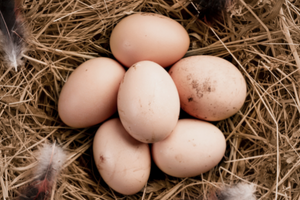 Fresh farm eggs can be kept for up to 9 months or longer outside of a fridge, if kept in the right conditions.
Fresh farm eggs can be kept for up to 9 months or longer outside of a fridge, if kept in the right conditions.
It is important to use fresh farm eggs as the natural, protective coating has not been washed off, and they have not been refrigerated (once refrigerated, keep refrigerated).
Any soiling can be wiped off with a dry soft cloth. One method to keep eggs fresh is to turn them over 3 times a week in their boxes or trays.
⇒ Learn How To Keep Eggs Fresh For At Least A Decade
Another method is to wipe the shell with vaseline or mineral oil to seal the shell so that bacteria can’t get in, and moisture can’t get out.
Canned Foods
Some people store their canned foods in damp, warm places in direct sunlight. Moisture, heat and light are the enemies of long term canned food storage.
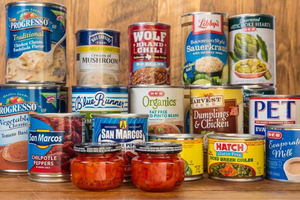
A damp garage or basement will cause the cans to corrode which will leave the canned foods at risk of becoming contaminated through the tiny holes that appear in the can when corroded. Canned food must be kept cool as warm temperatures result in a shorter shelf life. This means not storing them in warm, kitchen cupboards.
Cheese
This is another favorite that tastes better if kept out of the fridge. Hard cheeses such as cheddar and parmesan etc. are preserved already and do not need to be put in a fridge. Store these types of cheese in cool, dark places.
Related: Grandma’s Homemade Fresh Cheese
Cheese needs to breathe so it should not be kept in plastic as this actually dries out the cheese. Prior to storage, the cheese needs to be wiped over with white vinegar, wrapped in cheesecloth, double wrapped in parchment or freezer paper and then sealed with some tape.
Lettuce And Other Produce
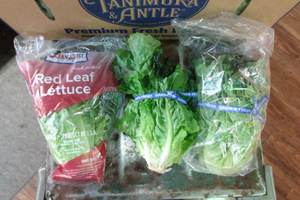 Most produce is sold in single use plastic bags and may stay that way when the shopper gets home. All produce needs to breathe, and plastic does not allow this to happen.
Most produce is sold in single use plastic bags and may stay that way when the shopper gets home. All produce needs to breathe, and plastic does not allow this to happen.
Produce will rot more quickly if the contents are not taken out of the plastic bag.
They also need to be stored in cool, dry, dark conditions for increased shelf life.
Peanut Butter
Peanut butter shouldn’t be refrigerated because it becomes too hard to spread on bread. It is better kept in the pantry. It is also better to keep the jar upside down to allow the separated fluids to seep back into the peanut butter.
This keeps the peanut butter mixed and will stop the need for stirring it before use. It is worth noting that only clean utensils should be used so as to prevent bacteria from contaminating the contents.
Potatoes
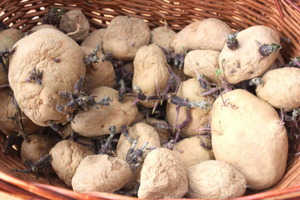 Potatoes and other root vegetables are another no-no for the fridge. This is because the cold temperature turns the starch into sugar which affects the taste, texture and longevity of the potatoes.
Potatoes and other root vegetables are another no-no for the fridge. This is because the cold temperature turns the starch into sugar which affects the taste, texture and longevity of the potatoes.
Potatoes are best stored unwashed in dry, cool, dark places such as a root cellar.
⇒ Cheap And Easy Way To Build A Root Cellar In Your Backyard
They should be in breathable containers such as burlap sacks or perforated paper bags etc. Potatoes and onions must not be stored together as each of them gives off gasses that will make the potato rot and the onion to sprout and develop mold.
Pasta And Other Dried Foods
Pasta and other dried foods need to be stored in cool, dry places that are not exposed to sunlight.
The habit of having these types of food in close proximity to the stove will shorten their lifespan. Heat and moisture from the stove will quickly deteriorate pasta, causing mold to develop.
Flour
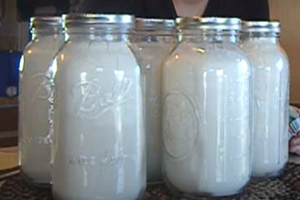 Flour bought in a paper bag from the store needs to be repackaged into airtight containers or canned.
Flour bought in a paper bag from the store needs to be repackaged into airtight containers or canned.
Related: How to Can Flour for SHTF
This is because the paper bag cannot protect the flour from sources of moisture that will cause flour to mold.
Flour should be kept in cool, dry, dark places such as a root cellar. For ultra long storage, it is better to store whole grains in usable portions that can be ground into flour as it is needed.
Fruit And Vegetables
It is better to keep fruit and vegetables separate because of the detrimental effects of ethylene gas in causing fruits and vegetables to decay quickly. Generally speaking, fruits, when they are ripening, give off a lot of ethylene gas.
Vegetables on the other hand are quite ethylene sensitive and so should not be stored near fruits. Different fruits also need to be kept apart from each other so as to slow down the ripening process.
In general, vegetables can be stored together, but this does not include potatoes and onions. Bell peppers, berries, citrus fruits and pineapples can be stored with any fruit or vegetable.
Storing food in the correct containers and conditions will ensure you get the longest possible shelf life. Not having a fridge is not such a big deal. Plenty of food items that people routinely put in the fridge actually do better at room temperature (or a cool root cellar).
Refrigeration is not always required, and in some cases causes the food item to lose flavor, texture and to decay more quickly. This is great news for preppers who prefer to live off-grid.

No comments:
Post a Comment